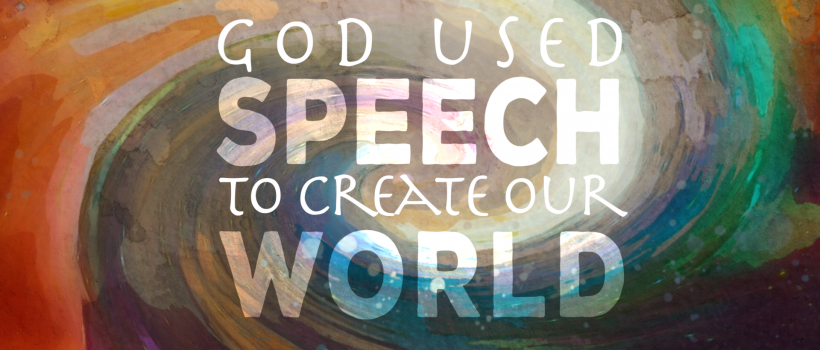Words Create Worlds – the power of speech and the danger of cancel culture

Transcript:
Did you know that God used speech to create our world?
The Mishna in Masechet Avot at the beginning of Chapter 5 tells us,
“B’asara ma’amarot nivra haolam,” – “The world was created with ten utterances.”
This is a reference to this week’s Parsha of Bereishit, in which on nine different occasions the Torah says, “And God said let there be -” this or that. In addition, the opening verse of Bereishit according to the Gemara is also a statement.
The Mishna is pointing out that surely Hashem could have created the world with one utterance. Why ten utterances? The Mishna gives the following answer: In order to increase the reward for the righteous who sustain the world created with ten utterances and to increase punishment for the wicked who destroy the world created in this way.
What I find intriguing is that the Mishna points out that Hashem could have created the world with one utterance such as, “Let there be a world.” But the Mishna could have asked a better question. Surely Hashem didn’t need any utterance at all! God is all powerful! He can just think, “Let there be a world,” and the world would come about!
It is clear that Hashem wanted to show us the power of speech. Speech can create a world and speech can destroy a world.
Indeed we find how powerful speech is, prompting King Solomon in the book of Mishlei (Proverbs) to declare,
“Chaim v’mavet b’yad halashon,” – “Life and death are in the hands of the tongue.”
The great commentator Ibn Ezra divides up all the commandments of the Torah into three categories:
- Mitzvot asei – the practical commandments which require action,
- Mitzvot halev – commandments of the heart which require contemplation, thought, belief, feelings, and
- Mitzvot hapeh – the oral commandments – numerous mitzvot which are performed through us saying something or desisting from saying something.
In addition so many of the mitzvot asei the practical commandments are introduced by a statement, a bracha (blessing), highlighting for us how crucially important it is what we say.
Through our sayings we can be mekadesh shem shamayim – we can sanctify the name of God in this world, or God forbid through what we say we can also be mechalel shem shamayim – we can desecrate the name of God. We can bring kedusha – added holiness – into this world through our oral statements and at the same time we can destroy.
We’re living in a world in which, worryingly, there is an increasing tendency for people to try to demonise others. Instead of engaging in a machloket lesheim shamayim – an argument for the sake of heaven – where you tackle the issue rather than the person pronouncing it, now there is a tendency to try to cancel out that person, to blacken his or her name, to tackle the individual and to try and destroy that person.
From Hashem Himself we learn how speech needs to be used for constructive and positive purposes. After all, God created our world through speech. So let us therefore strive to be always amongst the righteous who sustain the world through what we say.
Shabbat shalom.
You can receive weekly insights like this from the Chief Rabbi based on the parsha.
Just fill in the D’var Torah form below.

